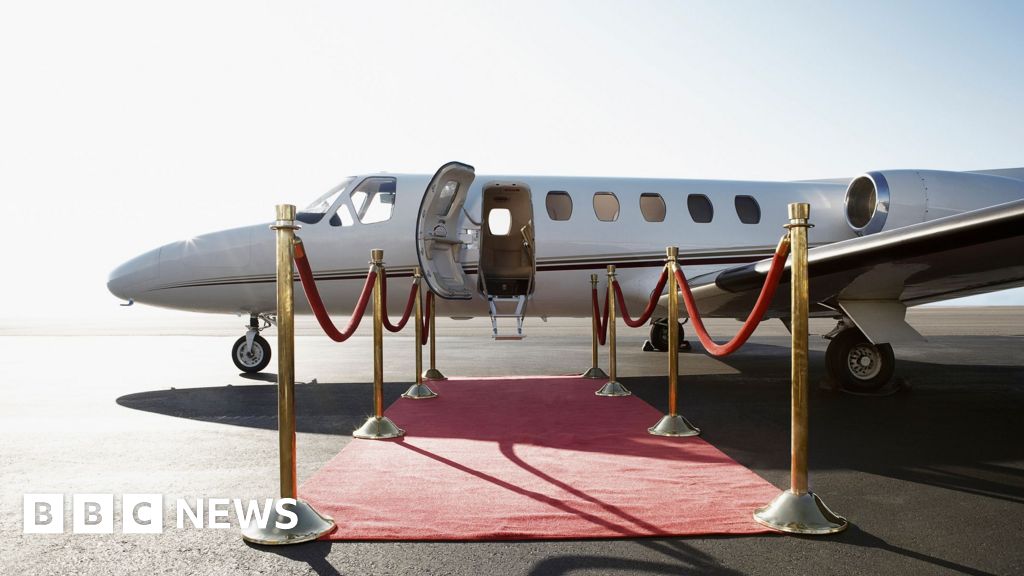 Getty Images
Getty ImagesThe mega-rich are using private jets like taxis, warn climate scientists who tracked the flights to calculate the planet-warming gases they emit.
Scientists found that carbon dioxide emissions, which contribute to climate change, increased by 46% between 2019 and 2023.
The researchers tracked all private flights globally, including summer weekend trips to Ibiza, Spain and trips to the FIFA World Cup and the UN climate conference in Dubai.
Flying in a private jet for a single hour can release more carbon dioxide into the atmosphere than the average person produces in a year, according to the research team.
“There are a lot of people who use these planes as taxis, where you cover any distance by plane simply because it’s more convenient,” said Professor Stefan Gossling, of Sweden’s Linnaeus University, who led the research.
“If someone’s flight emits as much in an hour as the average human being emits in a year – just to watch a football game – then maybe that shows that those people think they are outside the standards we have as a global community.”
In 2023, private flights produced an estimated 15.6 million tons of carbon dioxide – the equivalent of 3.7 million petrol cars being driven in a year – according to research.
Overall, this is small compared to global carbon emissions. It represents about 1.8% of emissions from all air travel, and aviation is 4% of global emissions.
Prof Gossling said the emissions “may not seem like a lot, but this is a small fraction of humanity and each of these individuals in a year is emitting more than a small town in Central Africa” by traveling on private jets.
Each person produces about 4.3 tonnes of carbon dioxide each year, on average – but in Central Africa, this drops to 0.1 tonnes.
The 46% increase in emissions from private jets is probably due to increased demand and restrictions on commercial travel caused by the Covid pandemic.
 Getty Images
Getty ImagesPeople who fly private jets are usually among the wealthiest in the world, sometimes referred to as “extraordinarily high net worth” individuals.
The group is estimated to consist of around 256,000 people, 0.003% of the global adult population, each owning an average of $123m (£95m), according to the scientists.
The team mapped the flight paths of a number of internationally known figures, referred to in the report only as “well-known actors, singers and directors”.
One traveled by private jet 169 times in 2023, releasing around 2,400 tonnes of carbon dioxide – the equivalent of driving 571 petrol cars for the whole year.
The scientists chose not to name individuals, making it clear they did not want to point the finger at any one person.
Most aircraft were registered in the US (69%), followed by Brazil, Canada, Germany, Mexico and the UK.
Many of the flights were for entertainment or events such as film festivals and football matches, according to the researchers.
And 47.4% were less than 500 km (300 miles).
Private flights to Ibiza, Spain and Nice, France peaked during the summer, with arrivals and departures concentrated on weekends.
The 2022 FIFA World Cup coincided with 1,846 planes arriving in Qatar, generating around 14,700 tonnes of carbon dioxide.
The team also found 291 private jets grounded in the UAE in time for the UN climate conference in Dubai in 2023, generating 1,500 tonnes of carbon dioxide.
Prof Gossling said those flights were probably for very wealthy businessmen traveling to the climate conference.
The research did not include heads of state or politicians, who are more likely to fly on chartered rather than privately owned planes.
The researchers calculated emissions from 18,655,789 flights by looking at the time in the air and the average fuel consumption of the aircraft models.
Tracking information is available on the ADS-B Exchange flight tracking portal, which Prof Gossling considered the most reliable tracker of this type of data.
“In 10 years, people will wish we had done a lot more to stop climate change,” Prof Gossling said.
“We need to reduce some activities and we need to start at the top in order to make the statement that everyone has a role to play in reducing emissions.”
Without action, the world could warm by 3.1 degrees Celsius this century, a recent UN report found. It is already 1.2C above pre-industrial levels.
And by 2050, emissions from commercial travel are projected to be increases to more than 2.5 times the level in 2021.
The International Air Transport Association has pledged to make global aviation net zero by 2050.
But many scientists are not convinced that there is a clear alternative to traditional fuel that would allow increased air travel without releasing more planet-warming gases.
The research was published in the scientific research journal “communications earth & environment”.

